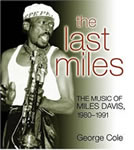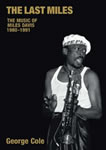I was born in Liverpool, England in 1957 and educated at Bingley College of Education in West Yorkshire (now sadly gone) and Homerton College, Cambridge. I was a teacher for 13 years and became a full-time freelance writer in 1991. I write about music and technology and have written for various publications including, The Financial Times, Jazzwise, The Guardian, Music Week, The Daily Telegraph, Empire, The Times, Times Educational Supplement, The Sunday Times, Newsweek, New Scientist and The Radio Times website. The Last Miles is my first book.
I grew up listening to funk, soul and rock in the 1970s and became hooked on Miles’s music in 1981, when I first heard The Man With The Horn. I was fortunate to see Miles in concert eight times during his final decade, from the 1983 band that featured Mike Stern and John Scofield to his final London concert in July 1991, just two months before he died.
Author’s Q&A
Why did you write The Last Miles? Aren’t there enough books on Miles already?
There are three reasons. First, this is music I feel passionately about. Miles’s music of the 1980s really moves me. It was the music I saw him play live and out of all the wonderful music Miles played over nearly 50 years, it’s the period I enjoy the most. The second reason is that – with one or two honourable exceptions – this period is poorly chronicled. All too often, I’d buy a book purporting to be about Miles and his music and find that the last ten years were either ignored or skipped over. The third reason was that there were many gaps to be filled – how did Miles work with the young group of musicians from Chicago? How did he get into hip-hop? And I’ve always been intrigued by the Rubberband album Miles recorded when he moved to Warner Bros and which was rejected by the record company. I also wanted to know more about the many musicians who played with Miles and whom hardly ever get mentioned, let alone interviewed.
In answer to the second question. Miles was a musical giant and saying there are too many books about him is like saying there are too many books about Beethoven or The Beatles (though I suppose you could argue about the latter). Besides, a lot of information in my book is new.
How did you start writing the book?
Very slowly! I interviewed George Duke back in 1998 and was intrigued by his description of how he worked with Miles on Tutu – the first time I had heard about it. I thought it would be interesting to look at the music Miles made in his comeback years. However, for various reasons (including a hectic work schedule!) I had to put the project on hold until 2001. By then a few new books on Miles had been published, but still none of them filled in all the gaps. There’s more on this in the introduction to The Last Miles. I finished the book in autumn 2004.
Why did you want to interview so many people?
Because they’re the ones who know Miles and his music best!
Who did you interview first?
Although I spoke to George Duke first, the first person I interviewed when
the book project started was Felton Crews, the bassist from the Chicago group of musicians who helped Miles back into music in 1980. Felton also put me in touch with other members of that group – Vince Wilburn Jr, Randy Hall, Robert Irving III and Glenn Burris.
Who did you interview last?
It was George Butler and Wallace Roney, and that was thanks to Paul Buckmaster, who put me in touch with both. I talked to them over a weekend and the following Wednesday, my book went off to the publisher. It was great to include them and my book is much better as a result.
Did you get to interview everyone you wanted?
No. I had hoped to interview all 36 members of Miles’s 1980s bands, but was five short. Four members declined and one I couldn’t trace. There were also a number of musical associates who declined to be interviewed. Even so, I was overwhelmed by the response to my interview requests and so many people were fantastically helpful and supportive, even when I was being a pain and repeatedly approaching them for further information. Incidentally, the one band member I couldn’t trace was Rudy Bird, so if you know what Rudy’s up to now, please let me know!
Why did you interview members of Miles’s former bands?
That was a great idea from my friend Jack Kenny. In fact, it was fascinating to hear what people who played with Miles in the 1970s – rightly seen as a fantastically creative period for Miles – thought about the music of the last decade. You’ll have to read the book to find out what they think, but it’s very interesting and very polarised!
Why do you like this music so much? Isn’t it lightweight compared with the stuff Miles did in the 1970s and where is the Kind of Blue of the 1980s?
My criterion for good music is simple: it’s music that moves you; that connects with you, that makes you feel something. Miles’s music of the 1980s does this for me. I also think it’s a rather fatuous exercise to try and compare different periods of Miles’s music: which is better – Kind of Blue or Bitches Brew? Miles Smiles or Agharta? As for the classic albums of the 1980s – I think it’s too soon to say yet, although I certainly feel that Tutu is a strong contender. It was 30 years before the music Miles made in the 1970s was more widely appreciated.
Why are so many people down on the music Miles made in the 1980s?
A combination of reasons. First, many jazz critics grew up to listening to Miles’s earlier music and that’s what connects with them. If you first heard Miles play with the second great quintet and it hit you, that’s most likely to be the music closest to your heart. Miles had a habit of leaving his fans and critics behind and I’ve no doubt that if Miles had lived another ten years, I would have been one of those complaining about the new music he was playing and how it wasn’t as good as the stuff he played in the 1980s! I think some people also felt it was too popular, too commercial, but Miles never saw anything wrong with trying to connect with as many people as possible. But I think the biggest problem is that Miles’s best music of this period was played live – if you simply use the studio albums as a barometer for Miles’s 1980s music, you get a distorted picture. Sadly, for a long time, little of his live music was officially released and there are still many great performances not out there.
Did you learn any surprising things about Miles?
Lots! I was surprised by the huge number of people who spoke warmly about Miles – even those who had left the band under less than ideal circumstances. A lot of people commented on his shyness and his wicked sense of humour. I also think he comes across as a more vulnerable and caring person.
Why did you go for an album-by-album, song-by-song approach?
As I spoke to people, I was accumulating all these amazing stories about how the music was put together. It just seemed natural to present it in this format. Besides, I’ve always liked reading books in this format, because you can read them cover-to-cover or dip into sections or chapters.
What do you hope your book achieves?
I hope it encourages more people to listen to Miles’s music from this period and for more people to write about it.

